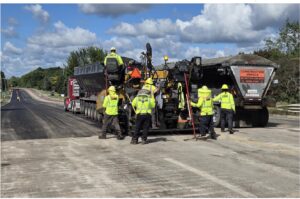Michigan Research Project Tests Rubber Asphalt Durability
Every day, nearly 20,000 vehicles drive on Ellsworth Road in Washtenaw County, Michigan. Now the high-volume road is part of a research project evaluating the performance of rubber asphalt made from scrap tires.
The project resurfaced a four-lane, one-mile corridor of the heavily-traveled county road making it an ideal testbed to compare rubber-modified asphalt with conventional pavement under heavy traffic conditions.
It’s a first for the Washtenaw County Road Commission (WCRC) though the technology has been used in other areas of the state.
“It’s been done around the state and several areas, but first time here,” Project Manager Neeko Robison said.
Robison says this nearly one-mile stretch of Ellsworth Road in Pittsfield Township is getting a noteworthy makeover.
 “This is not a typical paving project—it’s part of an innovative research partnership between WCRC, Michigan Technological University, ” he said. The goal is to evaluate the performance of a rubber-modified asphalt made from scrap tires.
“This is not a typical paving project—it’s part of an innovative research partnership between WCRC, Michigan Technological University, ” he said. The goal is to evaluate the performance of a rubber-modified asphalt made from scrap tires.
By incorporating recycled tires, the project aims to deliver smoother, safer, and longer-lasting roads, reduce waste and promote circular economy practices.
“We’re paving two inches of asphalt, using our rubberized asphalt mix,” Robison said. That mix includes scrap tire-derived crumb rubber. More than 7,000 scrap tires were recycled into rubber-modified asphalt.
Before any asphalt is poured and paved, a tire processor downsizes the tires into rubber granules, removing any metal.
“And you get the rubber part, and then you have to grind that so the rubber we utilize is pretty much a powder,” Sephr Mohammadi said.
Mohammadi is one of several Michigan Technological University PhD students overseeing the project.
For comparison, traditional asphalt was applied on a different segment of the road to help researchers study the performance differences over time, Mohammadi said.
“We want to show the benefits in terms of performance and also environmental impact,” he said.
University research shows the impact is significant. Though the road commission says rubber asphalt is slightly more expensive, it reduces rutting and cracks while extending a road’s life and lowering noise levels.
“We have cold temperature cracking resistance; we must make sure that in Michigan, we have sufficient resilience against cold temperature cracking,” Mohammadi said..
“We want to be efficient with the money we’re spending. The longer a road lasts, the better off we are,” Robison said. The project is funded by a grant from EGLE and Michigan Transportation Funds (MTF).
WCRC has also used rubber-modified asphalt for chip sealing approximately 100 miles of roads throughout the county funded through EGLE grants. And it’s not just Washtenaw. At the end of 2024, EGLE grants funded over 300 miles of rubber-modified pavement in over 30 communities across Michigan.
Kirsten Clemens, EGLE’s scrap tire coordinator, notes that scrap tires are increasingly being used in road construction projects. “It’s good to know that EGLE grants are supporting the use of scrap tires in many of these projects,” she said.
Sustainable road construction in Michigan continued to play out in 2025, facilitated by the use of EGLE grants for WCRC’s Ellsworth Road project, which used hot mix asphalt modified with ground tire rubber, and a Dickinson County reconstruction demonstration project which used high-content rubber-modified asphalt produced through the dry process
The 4.58-mile reconstruction demonstration project on CR 573 in Dickinson County, Michigan, featured a Gap-Gradation 5EML mix with 20 percent rubber by binder weight—equivalent to recycling about 22,300 tires. Portions of pavement originally built in the 1970s and 1990s were successfully rehabilitated. The work was completed in June 2025.
According to the Dickinson County Road Commission, conventional maintenance costs would have exceeded $4 million. By contrast, the new design was completed for just $1 million, proving both its cost-effectiveness and sustainability benefits.
Michigan Tech University partnered with the Dickinson County Road Commission on this innovative project—demonstrating how recycled materials can deliver stronger, longer-lasting, and more environmentally responsible roads.
This is more than a roadway upgrade—it’s the beginning of a journey to demonstrate how sustainability and performance can go hand in hand, bringing real benefits to both communities and the environment, Michigan Tech Professor Zhanping You said.
And, it’s a journey Clemons said that can’t be solved by one product, one process, one team, one agency or one organization alone. It takes collaboration, shared expertise and commitment to doing things better to improve and build safer, more durable road.
EGLE has partnered with the Michigan Department of Transportation, Michigan State University (MSU), Michigan Technological University (MTU), Lawrence Technological University, county road commissions, and the Minnesota and Alabama tire associations to improve paving, while recycling tires, positioning Michigan as a leader in innovative, environmentally responsible roadbuilding.
© Scrap Tire News, October 2025






